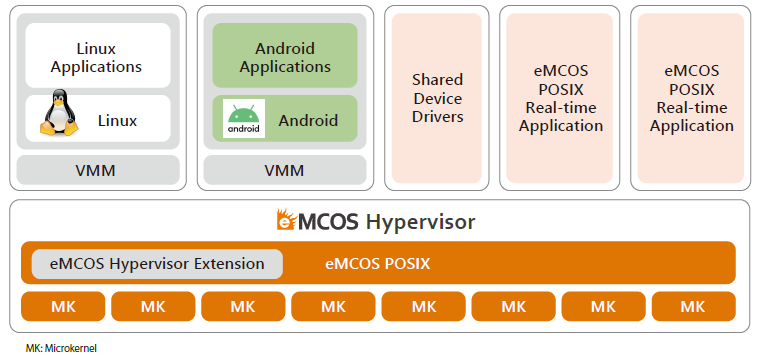Virtualization Using eMCOS Scalable RTOS, Enables Control of Linux or Android
eMCOS Hypervisor Enables Real-Time Processing with the Integration of Linux or Android
Tokyo, Japan. September 26, 2019 - eSOL, a leading developer of real-time embedded software solutions, today announced the release at the end of March 2020 of eMCOS Hypervisor (provisional name), an embedded virtualization function for eSOL’s eMCOS scalable real-time operating system (RTOS).
Designed as a certifiable RTOS with excellent scalability and performance, eMCOS supports the use of standard programming APIs and is capable of running on small 32-bit controllers and scalable to many-core processors.
eMCOS Hypervisor is implemented as an extension to the POSIX-compatible eMCOS POSIX RTOS. This means that real-time and safety-critical applications for eMCOS POSIX can be deployed next to Linux and Android guest OSes on the same hardware platform. This opens up a new dimension of scalability for eMCOS, providing users with greater scope for integrating related functions within a system while continuing to use their existing Linux- or Android-based platforms on eMCOS Hypervisor with minimal changes. Linux and Android guest-OSes provide the necessary POSIX-compliant API for an easy existing code reuse, as well as they support a large number of graphics display solutions and open communication protocols. The combination brings greater flexibility for implementing more advanced, open and diverse “mixed-criticality” systems.

The eSOL Technology Forum 2019 (Friday September 27, 2019 at the Tokyo Conference Center Shinagawa, Japan) will be showcasing a demonstration of virtualization using eMCOS Hypervisor.
◇
While eSOL’s RTOS platforms are already widely used in applications where a high level of real-time capabilities, reliability, and safety are demanded, including the automotive, industrial, and medical sectors, recent years have seen the requirements for systems grow in terms of scale and complexity. Examples include autonomous vehicles and the connected car in the automotive sector, and support for smart factory functionality and the autonomous control of industrial robots in the industrial sector. System integration and interoperation with other systems are becoming ever more important, even in those applications that have traditionally placed a high priority on real-time capabilities.
The architecture of the eMCOS RTOS consists of a kernel implemented on each CPU core, with high-speed messaging between them at the kernel level. This means that a single instance of eMCOS can control an entire SoC, even with complex heterogeneous, multi-core, or many-core architectures, while also ensuring the spatial and temporal isolation of applications with different reliability requirements without losing the ability for these isolated applications to work closely together.
These features have long made eMCOS an ideal RTOS for integrating complex systems. Now, the addition of virtualization brings even greater flexibility in mixed-criticality system configuration, making it possible to incorporate general-purpose operating systems like Linux without compromising real-time capabilities and safety.
◇
「The main features of eMCOS Hypervisor (provisional name) are as follows:
- Full isolation of mixed-criticality systems with different safety requirements running on the same hardware platform
- A high level of real-time capabilities made possible by the ability to run applications that use the advanced scheduling functions of eMCOS (semi-priority-based scheduling and temporal partitioning) on the same hardware platform as a guest OS
- The miniaturization and optimization of the virtualization functions embedded in eMCOS makes it possible to retain the high level of robustness in eMCOS
- Deployment of multiple guest OSes in a coordinated, optionally load-balanced manner, without compromising the determinism of real-time and safety functions.
◇
■For Reference
About eMCOS
eMCOS is a scalable, certifiable RTOS for embedded systems that was the first product in the world to scale from single-core to multi/many-core processors. The use of a distributed microkernel architecture unlike that of previous RTOSs enables eMCOS to provide the scalability to support not only different numbers of cores, but also heterogeneous hardware configurations with different architectures such as microcontrollers, GPUs, and FPGAs. eMCOS also incorporates eSOL’s proprietary semi-priority-based scheduling algorithm (patent numbers 5734941 and 5945617) that combines the real-time capabilities required for embedded systems with the high performance and scalability demanded by many-core processors. It also supports use of existing application development practices with the same programming model and interfaces for single-core and multi-core processors.
▽ For more information about eMCOS. please visit: https://www.esol.com/embedded/emcos.html
About eSOL Co., Ltd
Founded in 1975, eSOL is a leading company in the embedded systems and IoT sector that seeks to create a rich IoT society using its innovative computer technologies. eSOL’s software platform products and professional services, centered around its real-time operating system technology, are used worldwide in every field, starting with automotive systems, which conform to the most stringent quality standards, and including industrial equipment, satellites, and digital consumer electronics. In addition to the research and development of its own leading-edge products, and joint research with major manufacturers and universities, eSOL is actively engaged in AUTOSAR and Multi/Many-Core technology standardization activities.
▽ For more information, please visit: https://www.esol.com/
Trademark Notices:
* eSOL, eSOL Co.,Ltd and eMCOS are registered trademarks or trademarks of eSOL Co., Ltd in Japan and other countries.
* Other company or product names are trademarks or registered trademarks of their respective companies.

